Nepal earthquake: BBC offers 'lifeline' in emergency
- Published
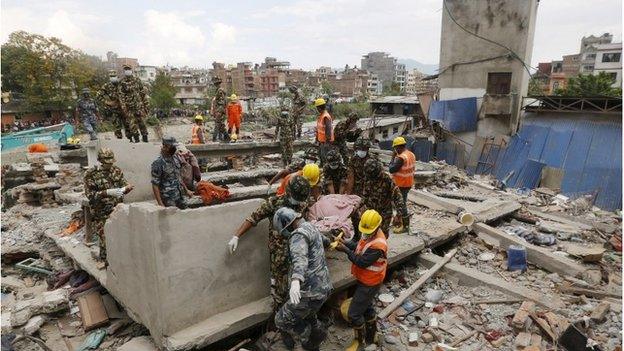
Nepal says eight million people - a quarter of its population - have been affected by the quake
The BBC World Service has stepped up broadcasts in Nepal as survivors struggle to cope in the aftermath of Saturday's devastating earthquake.
Many communities are still cut off and remain without phones or other communications in the country's worst disaster in 80 years.
The so-called Lifeline service, external is jointly produced by the Nepali Service and the BBC's international development charity, BBC Media Action.
A daily radio programme offers advice such as how to make dirty water drinkable, how to use an open toilet and stop disease spreading - as well as how to ignore false rumours about aftershocks and further earthquakes.
A chat app service on Viber, external and regular Facebook posts have also been launched.
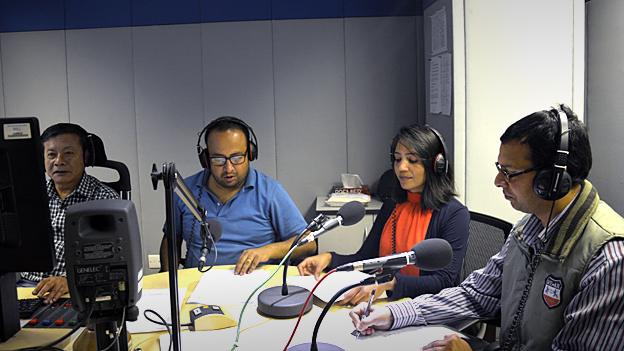
The "lifeline" radio programme is broadcast from the BBC office in Kathmandu
It's a mix of general public safety messages and direct audience contributions.
The programme interviews a doctor who advises listeners to treat themselves for minor injuries rather than go to the overcrowded hospitals.
It also advises families sleeping outdoors to keep an eye on their empty houses in case of burglary.
And there is also a call to be wary of "hawkers" or unscrupulous bus agents who are hiking the fares for buses that will never run.
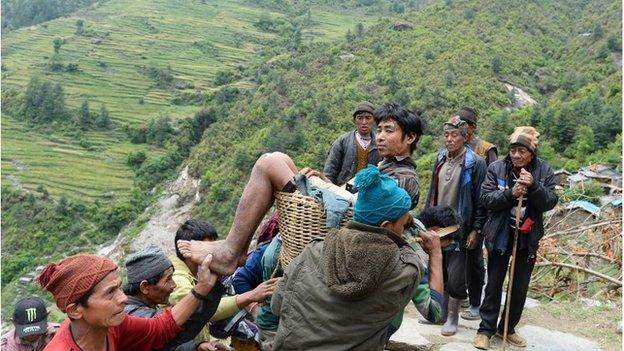
Many villagers around Nepal turn to the programme for news and information
Chandra Kanta Marahatta from Pokhara gets in touch with the programme.
"I ask the international community to deliver their aid directly to the affected people and places instead of giving them to the government officials for distribution," he said.
"I think it's the only way the funds can be put to proper use."
Meanwhile, Mohan Poudel from Butwal in western Nepal, is critical of the scare-mongering.
"Thank you to all the foreigners who are praying for the well-being of the Nepali people and sending aid," he said.
"Shame on those who are spreading false rumours and selling essential goods on the black market."
Dr Abdul Haq Ansari, from Birat Medical college, Biratnagar in eastern Nepal, is worried by the wider political situation.
"The whole country is in such a dire situation at the moment," he says.
"Why aren't political parties who claim to be doing politics in the name of the people directing their cadres to help the very same people who are in greatest need?"
'Duty'
Normally, the BBC Nepali radio news programme is broadcast via 250 FM partner stations but many of them were damaged in the earthquake so the service is also being distributed on shortwave radio.
The programme has been doubled in duration to 60 minutes.
While radio is a vital way to reach remote communities, the BBC is also going digital to reach as many people as possible.
The Lifeline service has also been launched in Nepali and English on the chat app Viber as well as regular updates being posted on the BBC Nepali Facebook page.
One of the people working on the radio programme is Jitendra Raut, a senior producer with the BBC Nepali service in Kathmandu.
He fled his sixth-floor flat when the earthquake struck and has been living with his in-laws as well as working around the clock.
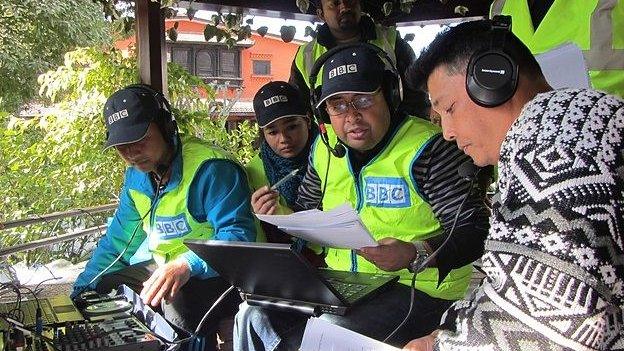
BBC Nepali's Jitendra Raut interviews an army representative during an earthquake scenario as part of BBC Media Action's lifeline training in February 2013
"We are motivated by a sense of duty. We know a lot of people in the worst hit areas only have us, the BBC, for the lifesaving information we broadcast," he said.
"This is what is bringing us to work every day since Saturday. I am putting on a brave face in front of my colleagues but I know they know that I'm pretending. We didn't come into journalism to run away at times like this."
And it's a similar story from Mona Laczo, the BBC Media Action country director in Nepal. The team is working from the garden of her house in Kathmandu.
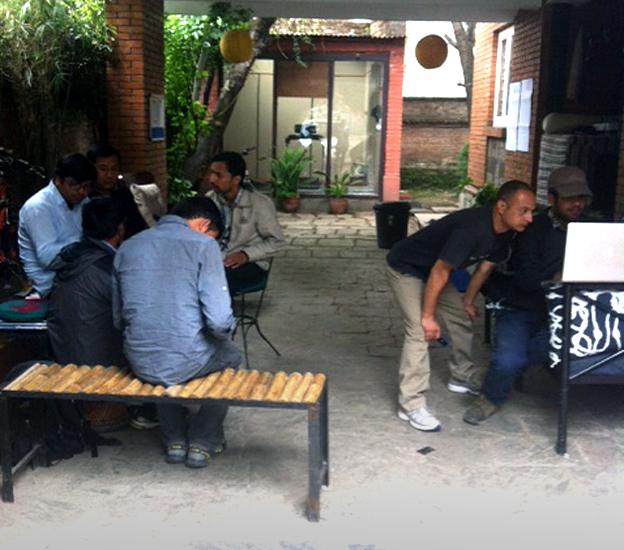
The BBC Media Action team are working from the country director's garden as it is too unsafe to use their office
"There is a lot of misinformation and the team really want to ensure that they are able to share correct and timely information," she said.
"All of our team members hold a strong commitment to bringing lifeline information to people affected by the earthquake. As a team, this is what we have done before the earthquake and this is what we are even more determined to do now."
Sanjaya Dhakal, a producer/correspondent with the BBC Nepali service in Kathmandu, echoes this.
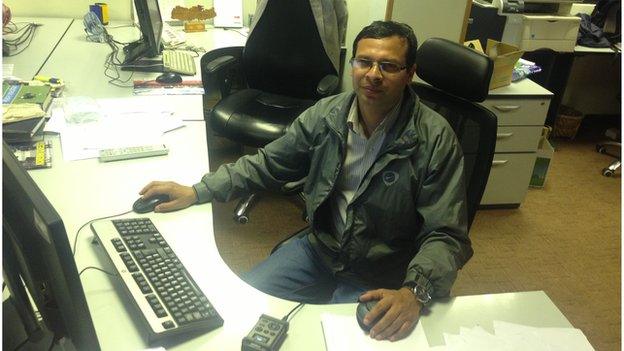
BBC Nepali service producer/correspondent Sanjaya Dhakal in the Kathmandu office
"I've had three consecutive nights spent sleeplessly in the open space in front of my house. People are afraid to go back to their home due to the aftershocks."
BBC Media Action has been working in Nepal since 2007. It has focused on child and maternal health, political accountability and the role of the media.
But it has also carried out preparedness training for such a disaster, training local journalists and providing them with equipment in anticipation of just such an emergency.
The BBC has broadcast a Nepali service since 1969.

How to access the service:
To access the BBC Lifeline service on your smartphone or tablet, log onto viber.com/bbcnepali
The Nepali language programme is available on shortwave as follows:
Nepali dawn transmission (01:30-01:45 GMT)
11995 kHz (25 metre band)
15510 kHz (19 metre band)
Nepali evening transmission (15:00-16:00 GMT)
9650 kHz (31 metre band)
5895 kHz (49 metre band)
The availability of World Service English on short wave to Northern India and Nepal has been extended with the service now starting one hour earlier than normal at 23:00 GMT.
Additional frequencies for World Service in English (to South Asia) from 23:00 GMT to 24:00GMT
5895 kHz (49 metre band)
9540 kHz (31 metre band)
From 00:00GMT the broadcasts continue as normal on 12,095kHz, 9,410kHz and 5970kHz
